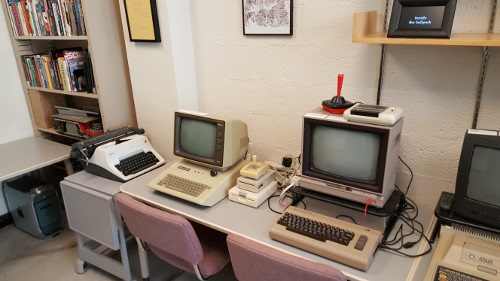The Trope Tank is accepting applications for a writer in residence during academic year 2016-2017.
Our mission is developing new poetic practices and new understandings of digital media by focusing on the material, formal, and historical aspects of computation and language. More can be discovered about the Trope Tank here:
The main projects of the Trope Tank for 2016-2017 are Renderings and Heftings, as I’ve described for a forthcoming article in _Convolutions 4_:
> The **Renderings** project is an effort to locate computational
> literature in languages other than English — poetry and other
> text generators, combinatorial poems, interactive fiction, and
> interactive visual poetry, for example — and translate this work
> to English. Along the way, it is necessary to port some of this
> work to the Web, or emulate it, or re-implement it, both in
> the source language and in English. This provides the original
> language community better access to a functioning version
> of the original work, some of which originates in computer
> magazines from several decades ago, some of which is from
> even earlier. The translations give the English-language
> community some perspective on the global creative work that has
> been undertaken with language and computation, helping
> to remedy the typical view of this area, which is almost always
> strongly English-centered.
> **Heftings,** on the other hand, is not about translation into
> English; the project is able to include translation between any
> pair of languages (along with the translation of work that is
> originally multilingual). Nor does it focus on digital and computational
> work. Instead, Heftings is about “impossible translation” of all
> sorts — for instance, of minimal, highly constrained,
> densely allusive, and concrete/visual poems. The idea is that
> even if the translation of such works is impossible, attempts at
> translation, made while working collaboratively and in conversation
> with others, can lead to insights. The Heftings project
> seeks to encourage translation attempts, many such attempts
> per source text, and to facilitate discussion of these. There is no
> concept that one of these attempts will be determined to be the
> best and will be settled upon as the right answer to the question
> of translation.
The Trope Tank’s work goes beyond these main projects. It includes developing creative projects, individually and collaboratively; teaching about computing, videogaming, and the material history of the text in formal and informal ways; and research into related areas. Those in the Trope Tank have also curated and produced exhibits and brought some of the lab’s resources to the public at other venues. The lab hosts monthly meetings of the People’s Republic of Interactive Fiction and occasional workshops.
There are no fees or costs associated with the residency; there is also no stipend or other financial support provided as part of the appointment. A writer in residence has 24-hour access to and use of the Trope Tank, including space to work, power and network connection, and use of materials and equipment. As a member of the MIT community, a writer in residence can access the campus and check out books from the MIT Libraries. We encourage our writer in residence to attend research and creative discussions and join us in project work and other collaborations, but this is not expressed with a particular requirement to be in the Trope Tank some amount of time per week.
To apply, email me, Nick Montfort, at moc.mkcin@mkcin with short answers (in no case to exceed 250 words each) to the following questions:
– What work have you done that relates to computation, language and literature, and the mission of the lab? Include URLs when appropriate; there is no need to include the URLs when counting words.
– How would you make use of your time in the Trope Tank? You do not have to offer a detailed outline of a particular project, but explain in some way how it would be useful to you to have access to the materials, equipment, and people here.
– What is your relationship, if any, to literary translation, and do you see yourself contributing to Renderings, Heftings, or both? If so, how?
– What connections could you potentially make between communities of practice and other groups you know, either in the Boston area or beyond, and the existing Trope Tank community within MIT?
Include a CV/resume in PDF format as an attachment.
Applications will be considered beginning on August 15; applicants are encouraged to apply by noon on that day.
We value diverse backgrounds, experiences, and thinking, and encourage applications by members of groups that are underrepresented at MIT.


